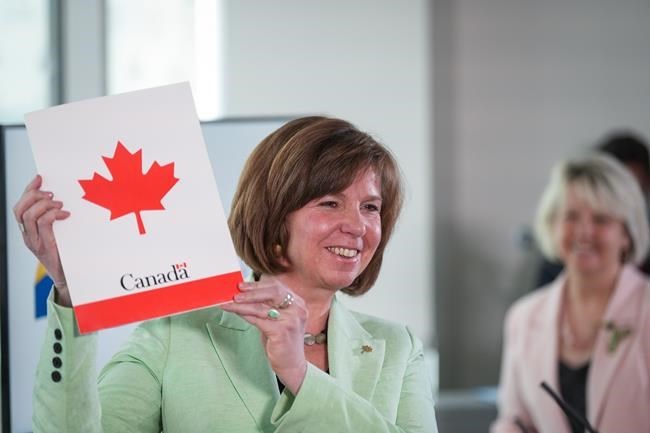VANCOUVER — British Columbia will soon join a handful of jurisdictions around the world where drug users are not criminalized for possessing small amounts of some illicit drugs for personal use.
Critics say that while decriminalization is a positive first step, the overdose death toll can only be stemmed if a safer supply of drugs is also available as part of a comprehensive public health approach.
Decriminalization in B.C. means charges will not be laid against anyone 18 or older possessing up to 2.5 grams of opioids, cocaine, methamphetamine or MDMA, also known as ecstasy, for three years, starting Jan. 31, 2023.
Uruguay, Portugal, Mexico, Argentina, Colombia, Ecuador and the state of Oregon all have introduced some form of decriminalization in an effort to curb overdose deaths.
Portugal was the first European country to decriminalize all drugs in 2001 and users were provided therapy rather than prison sentences, but B.C.'s addictions minister, Sheila Malcolmson, said decriminalization will not mean forced treatment.
Malcolmson also said substances will not be confiscated, unlike in Oregon, where possession nets a US$100 fine, unless someone agrees to a health assessment.
Carolyn Bennett, the federal minister of mental health and addictions, said a decriminalization proposal from Toronto Public Health is currently up for consideration, and the government plans to work with the city in the same way it did with B.C. to "get it to a place that would be successful."
Montreal, Edmonton and Saskatoon have also shown interest, but they have not submitted proposals seeking decriminalization, Bennett said, adding social supports must be ramped up in conjunction with any policy changes.
MJ Milloy, a research scientist at the BC Centre on Substance Use, said overdoses and drug use by youth have both dropped in Portugal.
But he said it's hard to compare that country's experience of decriminalization that started more than 20 years ago, and Canada's current fentanyl-fuelled crisis, in which the flow of synthetic opioids was disrupted during the pandemic, leading to a more toxic domestic supply.
Other differences include a national approach in Portugal, versus what is, for now, a temporary B.C.-only model.
The federal Liberals voted down an NDP bill on Wednesday to allow drugs for personal use across Canada.
In British Columbia alone, nearly 10,000 people have fatally overdosed since the province declared a public health emergency in 2016, with a record annual death toll last year, when 2,224 people died.
"We are different from Portugal, and because of the size and scope of our overdose crisis, I'm worried that we won't see the same magnitude of benefits that Portugal has enjoyed thus far," Milloy said.
"I think the federal government should be pursuing national solutions. A three-year pilot project of decriminalization, and very limited decriminalization in British Columbia, I don't think is enough to substantially move the needle on the overdose crisis."
A safer supply of drugs, to compete with unregulated street drugs, must also be considered, beyond the limited safer drugs available through clinical services in B.C., Milloy said.
Decriminalization is one aspect of a complex issue, he said.
"As a drug-use epidemiologist, it's not the sort of broad population-level intervention that we need to save people's lives, because this is unregulated capitalism — people selling drugs and buying drugs without any knowledge of where they came from or who to trust," he said.
"The toll of that is thousands of deaths."
Helen Jennens, whose two sons fatally overdosed, one from an addiction to prescription drugs, called decriminalization in B.C. a "half step," adding a threshold of 2.5 grams of hard drugs is too low for some people who would be forced onto the black market multiple times.
She said there's an "urgent" need for a safer supply to protect young people, who are not covered by decriminalization, which could amount to a "Band-Aid solution."
"My 13-year-old granddaughter is coming home and telling me about how many kids are using drugs in her Grade 7 class," said Jennens, a member of Moms Stop the Harm.
The advocacy group has been speaking to high school students and hearing disturbing stories, she said, adding that grieving parents like her have changed the message from "Don't use alone" to "Say no" because a small amount of drugs is potentially deadly, especially for those with little tolerance to illicit substances.
"I was presenting to a Grade 11 class of 24 students and six of them put up their hand when I asked if they'd lost someone to substance use," she said.
"Can we not see where this is going? It's really frightening."
Renée Merrifield, an Opposition B.C. Liberal member of the provincial legislature, said she visited Portugal in 2018 while she was a health authority board member and returned thinking the wraparound system of care for those struggling with addiction offered hope and dignity.
"It was everything from occupational therapy, physiotherapy, rehab, detoxification, psychology," she said.
Cost savings from the criminal justice and health-care systems have been funnelled into a comprehensive model of care that is key to the country's success in dealing with substance use, something Canada could learn from, Merrifield said.
"Are there challenges? Absolutely," she said. "I would have decriminalization as only one small part of an overall system of care. We need treatment, and that's my skepticism with where we're at today."
This report by The Canadian Press was first published June 1, 2022.
Camille Bains, The Canadian Press




